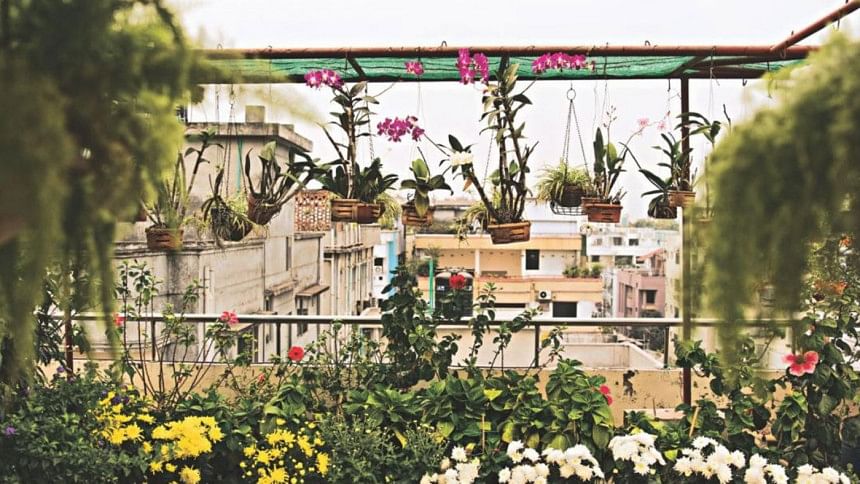Greening up the concrete

As I ordered a Hoya and a Dischidia, two beautiful trailing house plants, from a seller online, I was elated to think how easy it has become nowadays to buy plants from various Facebook groups and online shops. Since working from home from the very beginning of the pandemic, I have rarely stepped outside the house or have had any chance to physically visit the nurseries nearby.
For the first couple of months, I found it hard to maintain the balance between work and life. With no house help to assist me and my mother with the household work, I really struggled to maintain a healthy lifestyle. It gets worse when you have a four-year-old son who finds it difficult to cope with the new normal. To be frank, the pandemic was taking a toll on my mental health too.
After spending the first few months completely stuck at home, I realised that I had to do something to cope with the situation and decided to revive our rooftop garden, hoping it would be the best outlet for stress relief for me and my son. I always had a passion for gardening—I used to grow all kinds of flowers and vegetables on our rooftop. However, during the last few years, I couldn't pay much attention to it. And as I started working on my garden, I felt a big difference in the quality of time I was spending at home in isolation. All of a sudden, I started feeling connected with a wider community of plant lovers through various social media groups.
Becoming a member of these groups, I was amazed to know how people have been trying to live with at least some greenery at their home in a city where all the green is gradually vanishing from our sight. It felt great to see that people still dreamed of living a better life in what has been consistently ranked as one of the least liveable cities of the world. People are buying and selling all kinds of plants in these online groups, posting pictures of their plants and gardens, seeking help or offering suggestions about how to care for their plants, etc.
There is also a visible trend to buy rare and expensive imported plants and show them off in the groups which often creates a craze among the group members. But that's alright, as long as it means more greenery in these concrete enclosures.
Meanwhile, the online shops are making a hefty profit as many of them are selling plants at exorbitant prices, as many home gardeners allege. But there are also people and organisations who are not only selling plants but also trying to make a difference by performing some social responsibilities.
I came across one such organisation in Khulna that not only sells plants at reasonable prices but also provides some environmental services. The slogan they put in their Facebook group is "Zero waste is possible". One of the amazing services they provide is, they take old, used books and papers as well as non-biodegradable waste such as plastic from the people, and offer them plants or money in exchange. They are making people aware of the deadly impact of plastic pollution and encouraging them to recycle.
There are people who are not only passionate about growing plants but also try to reduce their carbon footprint through reusing empty plastic bottles as pots for their plants. However, it is disappointing to see how plastic flowerpots are still being produced and advertised in these groups by sellers.
Since I have to spend a lot of time in the kitchen now, I have developed a habit of keeping all the kitchen waste in a separate container and using them for making compost for my garden. I have learned how to make the best liquid fertiliser for my plants from regular kitchen waste. There is nothing you cannot use as a fertiliser—from banana peels and egg shells to used tea leaves and rice starch.
I have even discovered a man on a Youtube channel who buried two big fish heads underneath his tomato plants to see if that would have any impact on the plants. After several months, he found out that the plants grown on the soil with the fish heads buried underneath were stronger and produced more tomatoes over a long period of time.
Using kitchen waste for making compost and fertiliser has been a common practice among farmers across the world who prefer to do organic farming. It is an easy procedure which amateur gardeners can also learn very quickly.
As more and more people are becoming interested in rooftop gardening during the pandemic, it has also created an opportunity for managing our kitchen and plastic waste in an environment-friendly way. If these online platforms can be utilised to promote such good practices, we can surely expect to see a visible difference in our waste management practices. For a city like Dhaka, it can do wonders.
My few months of gardening experience have made me realise that change is certainly possible. We only need to want it from our hearts. I dream of a Dhaka where every building and structure will wear a touch of green. We cannot completely bring back the greenery that has already been lost over the years. But we surely can create some green space on our rooftops and verandahs.
Naznin Tithi is a member of the editorial team at The Daily Star.

 For all latest news, follow The Daily Star's Google News channel.
For all latest news, follow The Daily Star's Google News channel. 



Comments